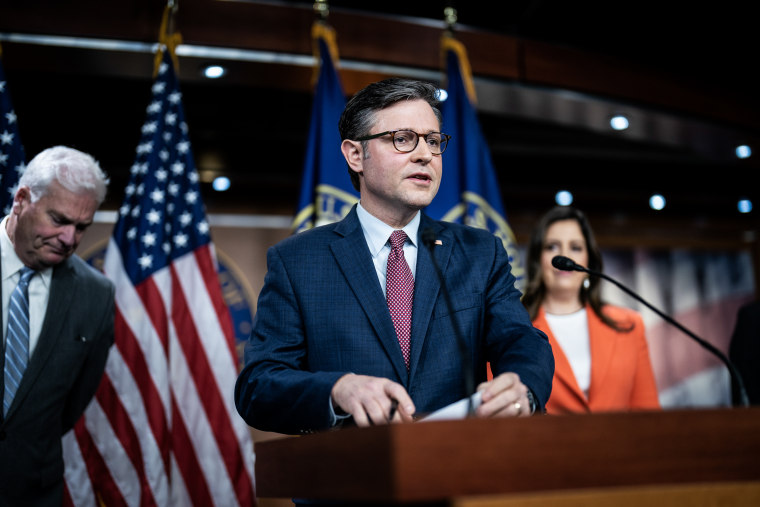WASHINGTON — The federal government runs out of money in less than two weeks, but House Speaker Mike Johnson and his leadership team have yet to settle on a strategy to avert a shutdown.
Johnson, R-La., and his team huddled Monday evening to review their options to keep the government open past the Nov. 17 deadline.
“Everything is on the table. We’re just evaluating the merits of each approach,” conservative Rep. Byron Donalds, R-Fla., said as he left the meeting, adding that the full House Republican Conference will discuss its options at a closed-door meeting Tuesday morning.
Johnson said last week his preference is to pass a continuing resolution through Jan. 15, which would keep the government’s lights on through the holidays and buy the House and the Senate more time to pass and negotiate all 12 appropriations bills.
But during the private meeting Monday, GOP leaders also discussed an idea, favored by conservatives, that calls for staggered, short-term stopgap funding measures. Under the latest proposal, Republicans would put three to four appropriations bills in a continuing resolution, or CR, until Dec. 7 and put the rest of the spending bills in a separate CR through Jan. 19.
“I’m open to just about any idea right now. But I like it because it does help us be focused on a timetable of getting our work done,” Donalds said. “Like in school or in a business world, you have a timetable to get your work done. And I’ve never seen anything like Congress where there is no timetables to get your work done.”
The idea, first proposed by Rep. Andy Harris, R-Md., a member of the far-right Freedom Caucus, has been discussed in the Capitol — and panned on social media — as a “laddered” CR. Johnson used the term in his first news conference last week.
But in Monday night’s meeting, GOP leaders warned their colleagues to stop using that phrase because it is confusing to the public, attendees said.
Regardless of what they call it, conservatives say they like the approach. The general concept would be to keep the heat on the Senate to pass individual appropriations bills while giving hard-line Republicans in the House, who typically balk at stopgap funding measures, incentives to vote for them.
“I think you’ll see very short-term funding bills, if we need those, to give a little bit of time to negotiate with the Senate,” said Rep. Bob Good, R-Va., another Freedom Caucus member. “I think you’re going to see the specifics of that rolled out, if we need to, over the coming two weeks.”
Johnson, who is enjoying a honeymoon period, has previously floated a short-term bill through January — or April, depending on what his members prefer — and even ultraconservatives said they're willing to give him space to pursue it. But the specifics of such a bill have yet to be hammered out.
Staffers for the top appropriators in Congress — the “four corners” — are poised to meet Monday evening to discuss a path forward, with more discussions expected throughout the week, a congressional aide said.
The deadline is nearing, and the Senate, having passed just three appropriations bills, is also considering a short-term bill.
It’s unclear when the Senate will act. But for now, Democrats are pressing their case that any bill must avoid partisan measures.
“Republicans have to decide what they want. Do they want to pass a bipartisan bill, or do they want a shutdown?” a Senate Democratic aide said.
Sen. Susan Collins, R-Maine, the vice chair of the Appropriations Committee, said her preference is to continue moving full funding bills in “minibuses” — packaging three at a time.
“I would prefer that we continue with the original plan, which was to have four minibuses,” she said.
The Senate passed one of those minibuses — to fund military construction and veterans affairs, agriculture, and transportation and housing — with bipartisan support last week.
A Senate Democratic aide said that there “seems to be momentum to avoid a shutdown next week” but that it’s unclear what that would look like.
Sen. Rick Scott, R-Fla., said he’s unfamiliar with the “laddered CR” idea and wants to ensure that any short-term bill is “tied to making sure we get appropriations done" rather than tossing all funding bills together in a massive, last-minute "omnibus," as Congress often does.
“That’s what the real focus is — that we don’t end up with an omnibus," he said of Johnson's plan. "He's opposed to an omnibus."


